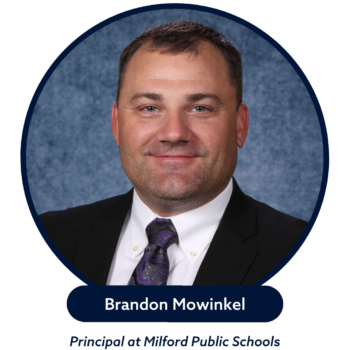Whether your school is shedding positive light on a new program, recognizing a student’s achievements, or contributing to a broader conversation about key issues affecting students and teachers—storytelling is a powerful tool. It becomes a disciplined and viable practice when schools commit to owning their narrative—that is, capturing, curating, and sharing the school moments that matter most. But how exactly do you do that? We’re tapping expert storyteller (read: published author) and lifelong educator and administrator Brandon Mowinkel for an inside perspective on school storytelling. Here’s what he had to say about identifying great stories and sharing them in meaningful ways.
Class Intercom: Storytelling seems to be on everyone’s mind, but it can sometimes feel like a broad or abstract concept. What exactly is storytelling?
Brandon Mowinkel: In the simplest terms, storytelling is taking our lived experiences and framing them in a manner that makes a connection. We all have varied lived experiences throughout our lives that have taught us lessons and shaped who we are and the values and beliefs we hold. Our worldviews are a direct reflection of the stories we consume and provide the foundation upon which we live.
CI: What impact can good storytelling have on a school and/or school community?
BM: Stories have three purposes: make meaning of the past, provide context to the present, and create a vision for the future. Just as stories are who we are as individuals—schools, groups, and communities own their own stories as well. Storytelling connects people and communities to a place or a time and elicits feelings and emotions that bring humans together or, unfortunately, create a divide. By using and framing stories within a school and community, a stronger sense of pride can be established, and a culture (either positively or negatively) can be reinforced.

CI: How should schools go about finding the stories they might want to tell?
BM: Talk to people! Ask questions. Solicit stories on social media. Find old pictures and ask what the story is behind them. Write stories down. Share stories on social media. Bring alumni back to share their experiences. Use veteran teachers to give context to past events. Talk to lifelong members of the community.
CI: One particularly unique thing about your work is your focus on who is telling the story. Share some thoughts on diverse storytellers.
BM: Everyone has their own unique story to tell based on their worldview, beliefs, and values. Even two people that experienced the same event will have differences in their recollections of what happened. We all interpret situations differently based on what is most important to us. We are the authors of our own stories, so we can highlight or “delete” various portions. But we can also learn from each other and the billions of stories out there.
CI: Tell us about a time when the way a story was told or the person who told the story was a game-changer.
BM: I truly believe that while everyone is a storyteller, some humans have an innate ability to grab and hold our attention. Thinking back to my own educational experiences, I remember very few actual lessons, but I definitely remember those teachers/professors who could captivate a room with their presence and their stories. To be able to frame an issue using a story is a gift that is special. Dr. Christensen is the first one that comes to mind. Through his vast lived experiences, he was able to tie nearly any topic back to what we were learning. Dr. Schultz was another. He lived a unique life and was deeply self-reflective. A lifelong Nebraskan, he attempted to live off the land for some time, and those stories made me see my own small-town life differently. Lastly, Dr. Stogdill framed so many life lessons for me in high school by sharing his own story. The list could go on, but these three were natural storytellers who were able to connect to their students through their gifts.
”Storytelling connects people and communities to a place or a time and elicits feelings and emotions that bring humans together or, unfortunately, create a divide. By using and framing stories within a school and community, a stronger sense of pride can be established, and a culture (either positively or negatively) can be reinforced.
Brandon Mowinkel, School Administrator & Author
More Resources & Information
Interested in learning more on this topic? Class Intercom’s Dr. Jill Johnson welcomed Brandon Mowinkel for a free webinar: Owning the Narrative: Lessons in Storytelling & Social Media for Schools & Districts. Register to attend live or access the recording below.
